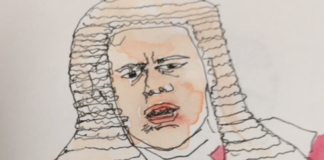- Legal eagle - 19th February 2026
- Round Robin - 19th February 2026
- Dark speak easy part one - 18th February 2026
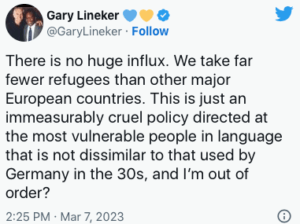 In the wake of the Gary Lineker affair, here we re-publish a piece by our Editor Phil Parry, from two and a half years ago. He spent 23 years at the BBC and looks with horror at what has happened.
In the wake of the Gary Lineker affair, here we re-publish a piece by our Editor Phil Parry, from two and a half years ago. He spent 23 years at the BBC and looks with horror at what has happened.
Mr Lineker had posted a controversial tweet, apparently attacking the UK Government’s policy towards refugees, however his supporters have declared this was from his personal account, and carpeting him undermines the concept of free speech.
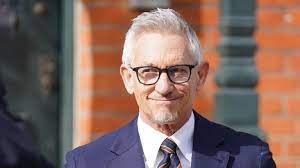
He has now been allowed back on air, but this apparent U-turn has provoked a storm of criticism, and a growing number of politicians as well as sports stars have poked fun at the corporation over it.
Mr Lineker has said modestly, if triumphantly, on Twitter: “After a surreal few days, I’m delighted that we have navigated a way through this. I want to thank you all for the incredible support, particularly my colleagues at BBC Sport, for the remarkable show of solidarity”.
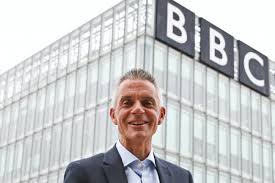
An independent review will now look into social media guidelines, as the BBC’s Director General Tim Davie denied that reinstating the former England footballer amounted to a climbdown by the corporation.
However some Tory MPs are furious at the decision to bring Mr Lineker back, proclaiming it gives him “carte blanche” to say what he likes on social media, despite Mr Davie insisting that until the review report is published, he will “abide by the editorial guidelines”.
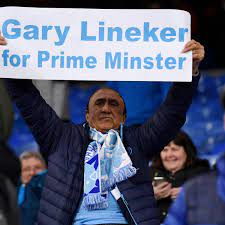
The new head of the BBC has said he would be prepared to sack stars who make major breaches of impartiality guidelines on social media. But will he? Here our Editor Phil Parry looks at some of the Tweets by his corporation’s presenters.
In the past he has described how he was helped to break into the South Wales Echo office car when he was a cub reporter, recalled his early career as a journalist, the importance of experience in the job, and making clear that the ‘calls’ to emergency services as well as court cases are central to any media operation.
 He has also explored how poorly paid most journalism is when trainee reporters had to live in squalid flats, the vital role of expenses, and about one of his most important stories on the now-scrapped 53 year-old BBC Cymru Wales (BBC CW) TV Current Affairs series, Week In Week Out (WIWO), which won an award even after it was axed, long after his career really took off.
He has also explored how poorly paid most journalism is when trainee reporters had to live in squalid flats, the vital role of expenses, and about one of his most important stories on the now-scrapped 53 year-old BBC Cymru Wales (BBC CW) TV Current Affairs series, Week In Week Out (WIWO), which won an award even after it was axed, long after his career really took off.
Phil has explained too how crucial it is actually to speak to people, the virtue of speed as well as accuracy, why knowledge of ‘history’ is vital, how certain material was removed from TV Current Affairs programmes when secret cameras had to be used, and some of those he has interviewed.
Earlier he disclosed why investigative journalism is needed now more than ever although others have different opinions, and how information from trusted sources is crucial at this time of crisis.

As Bob Dylan put it: “The Times They Are a-Changin”. Or at least that’s the impression those in charge like to give.
It’s been reported that the new Chairman of the BBC is likely to be the right-wing Brexiteer Lord Moore, who is an outspoken critic of the corporation. The Licence Fee could be at risk.
Meanwhile the new BBC Director General (DG) Tim Davie yesterday told his stars sternly who break impartiality rules on social media: “I am prepared to take the appropriate disciplinary action, all the way to termination”. He has also warned: “We will issue the social media guidelines which will be clear. I would note that Gary Lineker has been very clear in his statements recently, saying, ‘I understand I have responsibilities while working at the BBC’.
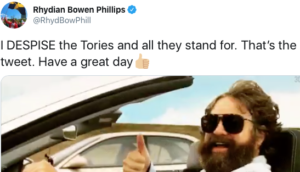 A statement about ‘responsibilities’ from Gary Lineker sits uneasily with his comment on Twitter this week to “Oh, fuck off”. It also makes strange bedfellows with different remarks on social media from some of Mr Davie’s other presenters.
A statement about ‘responsibilities’ from Gary Lineker sits uneasily with his comment on Twitter this week to “Oh, fuck off”. It also makes strange bedfellows with different remarks on social media from some of Mr Davie’s other presenters.
After his uncompromising stance was trailed with a speech in Cardiff, BBC Cymru Wales (BBC CW) presenter Rhydian Bowen Phillips declared on Twitter that he despises Tories, stressed that Wales should stand up to Westminster, and in one public message just said six times “Wales is a different country to England”. Even before the speech – and with controversy growing over the ‘bias’ of the BBC – Mr Phillips had made his views known. He tweeted a picture of himself flashing the ‘V’ sign at a poster of Margaret Thatcher. He hosts a BBC Radio Cymru (BBC RC) programme on Saturdays from 11am – 2 pm with the actress Shelley Rees and he has long made his opinions public, seemingly putting himself at risk of the new DG’s strict policy.

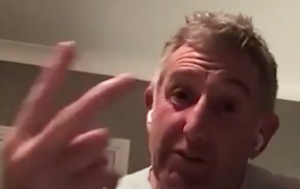
Or then there’s the BBC’s Welsh rugby commentator Jonathan Davies who has been publicly condemned by television viewers for talking “some shit”, as well as being “so so thick”, and who was filmed using a fire extinguisher in a dangerous prank.
On social media Mr Davies has recently sent a picture of himself with no clothes on to TV and radio star Carol Vorderman. He has faced huge criticism following statements which have included calling the Rhondda MP Chris Bryant a “knob” on Twitter, for asking about childcare during a House of Commons debate. The fury of Mr Davies has too been directed at journalist Marcus Stead on social media after he had criticised what he views as the Welsh establishment.
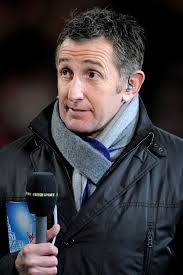
He engaged in an extraordinary spat with him, again using Twitter, in which he branded Mr Stead, an “attention seeking nobody”, a “sad pathetic waste of time” and ‘hashtagged’ the words “absolute bell end”.
Mr Davies was accused of being ‘misleading’, publishing ‘rubbish’ and ‘ranting’, after stating on social media that controversial plans to re-develop a Cardiff cancer hospital, would leave 60 per cent of a meadow available to walkers when campaigners say surveys have indicated all will be destroyed.
Contradicting him, one campaigner declared about the project to re-develop Velindre Hospital: “The whole area will be bulldozed, £27 million of public money just to access this unsuitable site…” Another cautioned: “Let’s talk Jonathan, not rant.”
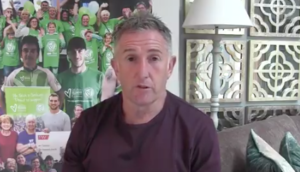
Mr Davies (one of whose Twitter accounts is @JiffyRugby and includes ‘OBE’ after his name) is President of Velindre Fundraising, and demanded of one of the campaigners: “Have you or anyone close to you ever been unfortunate enough to have cancer?” But the advocate for a green space in that part of the city hit back, and said: “Absolutely yes, many of those opposing the site are current patients at Velindre”.
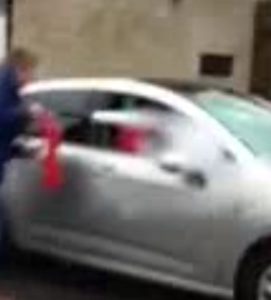
Warnings were repeated too about the hazards involved in the misuse of fire extinguishers after experts were shown shocking pictures from a video of Mr Davies using one to spray into the face of former international referee, Nigel Owens, as he sat in his car while another person filming the dangerous stunt laughed. This too was posted on the internet.
The escapade with a fire extinguisher was in the car park of an independent TV facilities house near BBC Cymru Wales (BBC CW) in Llandaff, Cardiff, in 2014, and was condemned as “incredibly dangerous”. It prompted a series of outraged comments at the time on a sports Facebook (FB) site.
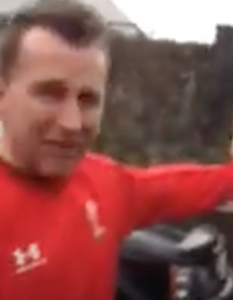
One critic said: “…did he give any thought to what injuries he may have caused?…We all like a good laugh sadly this isn’t it”. Another declared that Mr Davies was a “fucking prick”, a further detractor stated that he didn’t think “people realise how dangerous CO2 extinguishers are”.
In the clip now on YouTube, Mr Owens escapes from the car running, but Mr Davies uses the fire extinguisher again, as the person filming it exclaims in Welsh “OH, NO!”, and Mr Owens then shouts “IDIOT!” at him pointing.
Yet The BBC has long been beset by controversy, not least in Wales, and this highlights as well Mr Davie’s ‘get tough’ message.
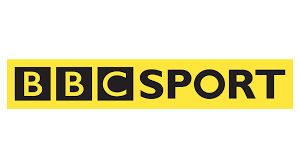
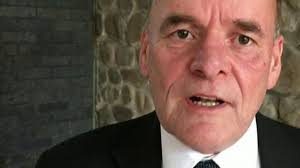
Major questions were raised about a senior BBC CW Editor who attacked the Crossrail 2 project as “UK taxpayers subsidising London’s local transport system” in a late night tweet.
The tweet by the corporation’s Welsh Affairs Editor, Vaughan Roderick, followed The Eye showing how he had also used Twitter to compare the union with England to an abusive relationship in another late night tweet. This outburst came days before the closely-fought referendum on Scottish independence six years ago, and as a programme about the vote presented by him was preparing to be transmitted. Corporation staff had to be reminded of internal guidelines soon afterwards.

Mr Roderick has also said – again on Twitter – that ‘The History Guy’ (presenter Dan Snow) used ‘national’ in an archaic British sense, and it was not a good look for BBC CW. In the Crossrail 2 tweet, posted at 12.08 am, Mr Roderick responded to a message from officials there saying that the project will support 60,000 supply-chain jobs and 18,000 apprenticeships across the UK.

In the earlier tweet before the Scottish independence referendum, which was also sent near midnight and which was later deleted, Mr Roderick said some unionists rejoiced in “threats and bullying”, but a television show hosted by Mr Roderick and filmed mainly in Scotland was still transmitted by BBC CW afterwards.
The controversy came hard on the heels of another incident when a senior UK BBC Editor was reprimanded and removed from an election when she tweeted an anti-UKIP message before a European poll (see – tmblr.co/ZwCEOs1Gj-yEO ).
Jasmine Lawrence had tweeted sarcastically: “#WhyImVotingUkip – to stand up for white, middle class, middle aged men w sexist/racist views, totally under represented in politics today”, and BBC personnel were warned not to “do anything stupid”.
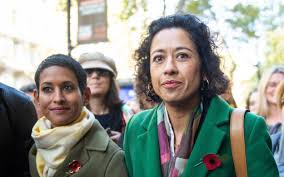
But The BBC hasn’t only been engulfed in scandals over tweeting controversial personal views – and the recent furore over the Proms is just one example. These too must be confronted by Mr Davie.
In January Samira Ahmed won an employment tribunal case after arguing that she should earn the same as Jeremy Vine, a male colleague. The BBC has faced enormous criticism too, for the huge salaries paid to presenters such as Mr Lineker, who was earning £1.75 million a year for Match of the Day before he offered to take a pay cut.
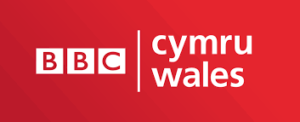
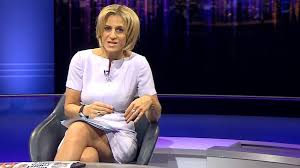
Regional and national newspapers as well as commercial broadcasters have also questioned the corporation’s reach, made possible by income from the licence fee. Its ‘free’ online content is believed to drive traffic away from regional media organisations and national newspapers. Commercial broadcasters complain that they are not competing on a level playing field. It is striking that BBC employees have told me that the online platform is provided by a subsidised service and has become a political football – something Mr Davie has vowed to address.

The BBC is still perceived to be too London-centric with most executives declining to move to Salford, where some programming is produced. It has been reported as well, that The BBC has a left-wing bias and is thought not to have even tried understanding what prompted people to vote for Brexit. There has, too, been criticism of the many ‘left-wing’ comics on its panel shows although the argument is that there are few ‘right-wing’ ones.
Several senior journalists at the corporation including Emily Maitlis and Lewis Goodall, of Newsnight, have been condemned for being biased, yet its charter requires its journalism to be impartial.
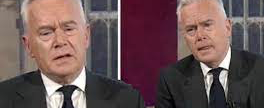
The use of social media by some senior figures to comment on political issues has also caused concern. Naga Munchetty, the BBC Breakfast presenter, was found to have breached guidelines over comments about a tweet by President Trump but Lord Hall of Birkenhead, then Director General, reversed the decision. The Welsh newsreader Huw Edwards, was accused of political bias after he ‘liked’ a tweet saying: “Vote Labour for the National Health Service”.
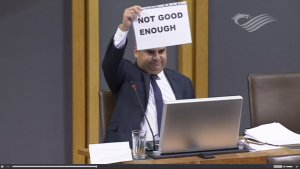
The corporation also featured in a UK newspaper giving readers details of a “brutal” report by its regulator which attacked “bias”, it has emerged. The report by regulator OFCOM stated: “They (audiences) feel that the BBC lacks relevant content for their cohort, or that there is bias in the news”.
Controversies over impartiality (or lack of it) have also long dogged BBC Cymru Wales (BBC CW), and it was forced to say sorry recently for ‘liking’ a ‘tweet’ attacking a political party. The tweet from Neil McEvoy MS undermined the Abolish The Assembly (AA) party, and BBC CW said that ‘liking’ it was an ‘error’.
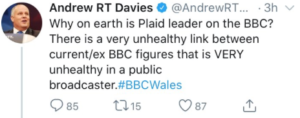 The apology itself, though, caused a storm on social media, with one critic saying officials had “backtracked” after getting “stick” A formal complaint was made about it, and another of the critics said on Twitter: “You mean liked and then told it mustn’t be liked. Not liked in error”.
The apology itself, though, caused a storm on social media, with one critic saying officials had “backtracked” after getting “stick” A formal complaint was made about it, and another of the critics said on Twitter: “You mean liked and then told it mustn’t be liked. Not liked in error”.
The former leader of the Welsh Conservatives (WC) in the WP, Andrew RT Davies, MS, accused, on social media, BBC CW of a “link” with nationalist party Plaid Cymru (PC) and that it was “unhealthy”.
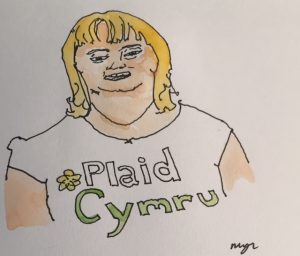
The unbelievable fight over alleged links between PC and BBC CW was soon after growing concern about figures who have joined the corporation from PC, and those that have moved in the other direction.
The political journalist at BBC CW Aled ap Dafydd became PC’s Director of Political Strategy and External Relations. Mr ap Dafydd’s transfer followed the appointment of the former PC Chief Executive Rhuanedd Richards as Editor of BBC RC and the Welsh language online service, Cymru Fyw. The PC MS for Ynys Mon Rhun ap Iorwerth was also formerly a leading political journalist at BBC CW, joining the corporation in 1994.
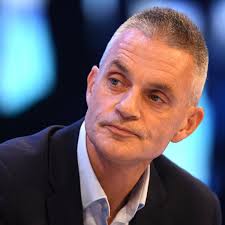
Perhaps this sort of behaviour is what Mr Davie had in mind when he proclaimed: “Our research shows that too many perceive us to be shaped by a particular perspective”, and stated that he wanted to stop presenters being “partisan campaigners on social media”.
The ones at The BBC could now face the sack – if Mr Davie means what he says.
But I’m not holding my breath…









